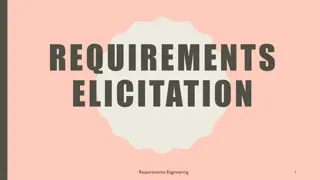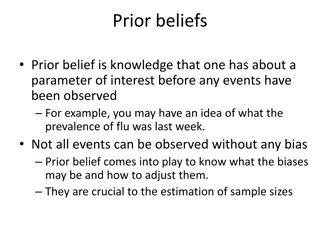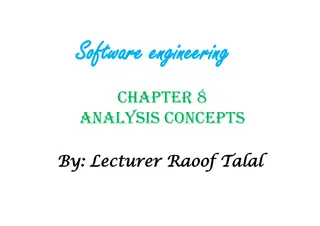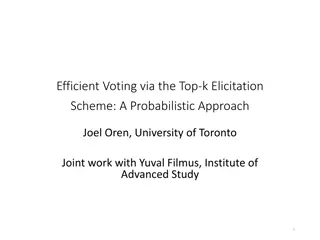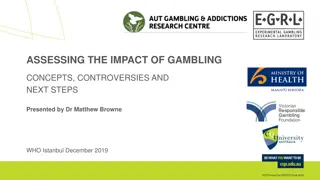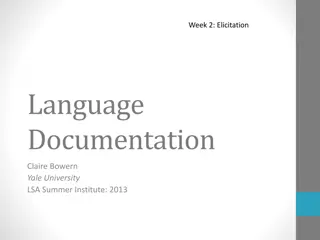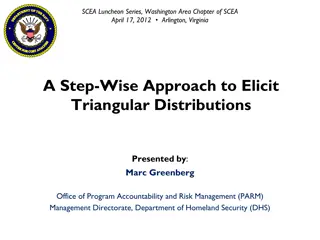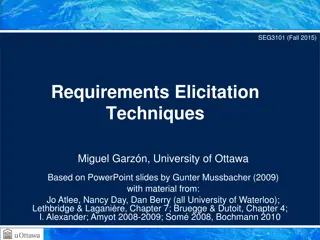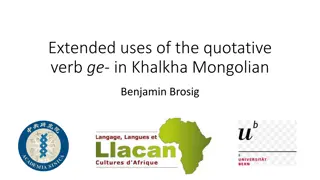Elicitation techniques
An outline of the requirements engineer's non-technical skills, including analytic thinking, empathy, communication skills, conflict resolution skills, and moderation skills.
1 views • 35 slides
Requirements Elicitation in Software Engineering
Understanding and gathering software requirements is a critical step in the software development process. This involves identifying, analyzing, documenting, and validating the needs and constraints of the project stakeholders. Effective requirements elicitation ensures that the final product meets t
0 views • 23 slides
Understanding Prior Beliefs and Eliciting Expert Opinions in Parameter Estimation
Prior beliefs play a crucial role in estimating parameters of interest before observing events. They can be elicited from sources like meta-analyses, literature, and expert opinions. Experts' beliefs are often measured using Beta or Normal distributions for different outcomes. Eliciting prior belief
0 views • 22 slides
Understanding Requirements Analysis in Software Engineering
Requirements analysis is a crucial task in software engineering that bridges the gap between system engineering and software design. It involves specifying software's operational characteristics, interface with other system elements, and constraints it must meet. Through elicitation processes like m
9 views • 30 slides
Efficient Voting via Top-k Elicitation Scheme: A Probabilistic Approach
This work presents a probabilistic approach for efficient voting through the top-k elicitation scheme, focusing on communication-efficient group decision-making. The goal is to select the best outcome while minimizing the extraction of excessive information from committee members. The study explores
0 views • 18 slides
Understanding the Impact of Gambling: Concepts, Controversies, and Next Steps
Dr. Matthew Browne's presentation in Istanbul in December 2019 discussed the theoretical framework, burden of harm projects in Australia and New Zealand, current work, and conclusions related to the adverse consequences of gambling on health and well-being. Focus areas included harm distribution, ta
0 views • 18 slides
Structured Elicitation Methods for Language Documentation
Explore various types of elicitation methods such as structured translation, grammaticality judgments, and picture identification tasks for language documentation. Learn how to design tests, conduct sessions, and analyze language outcomes effectively. Understand the importance of using appropriate v
0 views • 22 slides
Understanding Immunotoxicity in Fish: An Alternative Model for Toxicological Studies
The study explores the immunotoxic effects of industrial effluents on fin fish, highlighting xenobiotics' impact on the immune system. It discusses the sensitivity of the immune system to environmental toxins and the elicitation of immune reactions by various substances. The importance of fish as a
0 views • 25 slides
Expert Judgment Elicitation Process in Risk Management
Explore the expert judgment elicitation process for risk management, focusing on modeling inputs as triangular distributions, overcoming bias, and justifying expert opinions. Learn to convert distributions, engage in Q&A sessions, and incorporate visual aids effectively.
0 views • 34 slides
Requirements Elicitation Techniques Overview
This content provides an overview of requirements elicitation techniques, including analysis of existing systems, documentation, observation, and various methods like interviews, questionnaires, brainstorming, and prototyping. It highlights the importance of effective communication and understanding
0 views • 114 slides
Exploring Extended Uses of the Quotative Verb "ge" in Khalkha Mongolian
This research delves into the extended uses of the quotative verb "ge" in Khalkha Mongolian through evidence from corpora, sentence data, and elicitation methods. It highlights various types of functions such as minimal extensions, topicalization, clause connection, additive focus with "gese," inten
0 views • 37 slides

